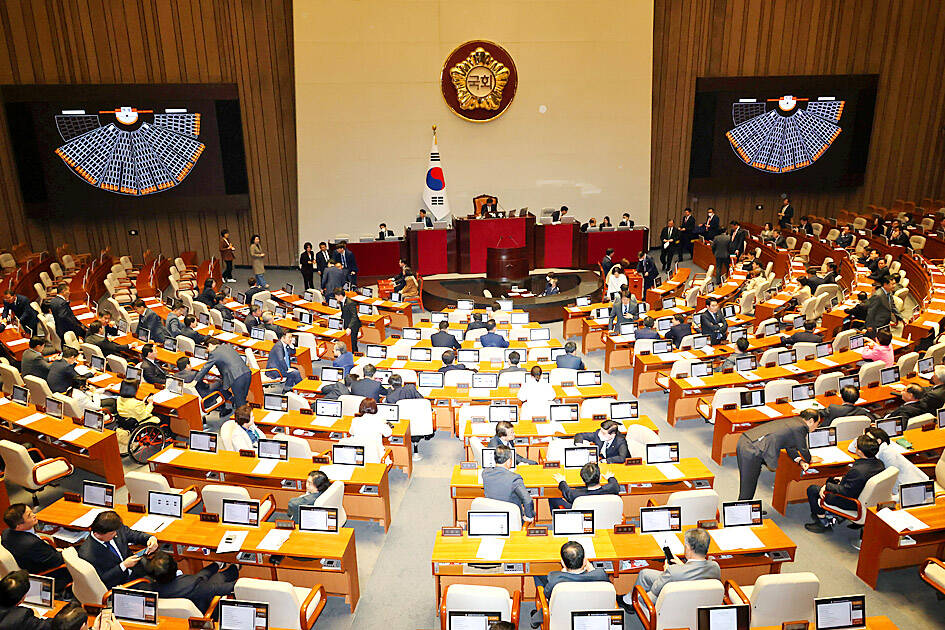Lawmakers in South Korea have proposed the country’s first same-sex marriage bill, in a move hailed by civic groups as a defining moment in the fight for equality.
The marriage equality bill, proposed by South Korean lawmaker Jang Hye-yeong of the minor opposition Justice Party and co-sponsored by 12 lawmakers across all the main parties, seeks to amend the country’s civil code to allow same-sex marriage.
The bill is unlikely to pass, but forms part of a trio of bills expected to increase pressure on the government to expand the idea of family beyond traditional criteria. The two other bills relate to civil unions and in vitro fertilization for unmarried women.

Photo: EPA-EFE
South Korea does not recognize civil same-sex partnerships. The constitution stipulates that marriage and family shall be established “on the basis of individual dignity and equality of the sexes.”
This provision has usually been regarded as restricting marriage to the union of opposite-sex couples.
“Family is the most basic unit that forms a larger community called society,” Jang said in front of the South Korean National Assembly yesterday.
“It’s a historic moment, but this is just the start,” said Ryu Min-hee, a lawyer at the Marriage Equality Korea civic group. “The bills must be discussed by the National Assembly immediately.”
Past efforts to grant legal rights to same-sex couples have been opposed by religious groups that claim such moves would “legalize homosexuality.”
The same argument has been used to block anti-discrimination legislation.
Yesterday’s announcement follows a landmark ruling in February that recognized the legal status of same-sex couples for the first time in terms of national health insurance.
As South Korea faces an impending demographic crisis, including a world-record low birthrate, there have been increased calls to redefine the concept of a family.
Moves to broaden the definition to include cohabiting couples or single-member families were reversed under the administration of South Korean President Yoon Suk-yeol.
South Korea’s potential, though unlikely, move toward marriage equality comes at a time when other countries in the region are making advances.
Taiwan, Australia and New Zealand have already extended marriage rights to same-sex couples.
In Japan on Tuesday, a court ruled that a ban on same-sex unions was unconstitutional.
Social consensus is often stated by politicians as the reasons for opposing equality laws, including same-sex marriage.
A Hankook Research survey said that 52 percent of respondents opposed the idea of legislating same-sex marriage in South Korea.
Jang said that the responsibility of politicians is to contribute to the process of achieving this consensus.
“Enacting laws is the process of achieving social consensus in a democratic society. I don’t think that these two things are separate or that one comes before the other,” she said.

Yemen’s separatist leader has vowed to keep working for an independent state in the country’s south, in his first social media post since he disappeared earlier this month after his group briefly seized swathes of territory. Aidarous al-Zubaidi’s United Arab Emirates (UAE)-backed Southern Transitional Council (STC) forces last month captured two Yemeni provinces in an offensive that was rolled back by Saudi strikes and Riyadh’s allied forces on the ground. Al-Zubaidi then disappeared after he failed to board a flight to Riyadh for talks earlier this month, with Saudi Arabia accusing him of fleeing to Abu Dhabi, while supporters insisted he was

The Chinese Embassy in Manila yesterday said it has filed a diplomatic protest against a Philippine Coast Guard spokesman over a social media post that included cartoonish images of Chinese President Xi Jinping (習近平). Philippine Coast Guard spokesman Jay Tarriela and an embassy official had been trading barbs since last week over issues concerning the disputed South China Sea. The crucial waterway, which Beijing claims historic rights to despite an international ruling that its assertion has no legal basis, has been the site of repeated clashes between Chinese and Philippine vessels. Tarriela’s Facebook post on Wednesday included a photo of him giving a

Syrian President Ahmed al-Sharaa on Sunday announced a deal with the chief of Kurdish-led forces that includes a ceasefire, after government troops advanced across Kurdish-held areas of the country’s north and east. Syrian Kurdish leader Mazloum Abdi said he had agreed to the deal to avoid a broader war. He made the decision after deadly clashes in the Syrian city of Raqa on Sunday between Kurdish-led forces and local fighters loyal to Damascus, and fighting this month between the Kurds and government forces. The agreement would also see the Kurdish administration and forces integrate into the state after months of stalled negotiations on

‘SHOCK TACTIC’: The dismissal of Yang mirrors past cases such as Jang Song-thaek, Kim’s uncle, who was executed after being accused of plotting to overthrow his nephew North Korean leader Kim Jong-un has fired his vice premier, compared him to a goat and railed against “incompetent” officials, state media reported yesterday, in a rare and very public broadside against apparatchiks at the opening of a critical factory. Vice Premier Yang Sung-ho was sacked “on the spot,” the state-run Korean Central News Agency said, in a speech in which Kim attacked “irresponsible, rude and incompetent leading officials.” “Please, comrade vice premier, resign by yourself when you can do it on your own before it is too late,” Kim reportedly said. “He is ineligible for an important duty. Put simply, it was